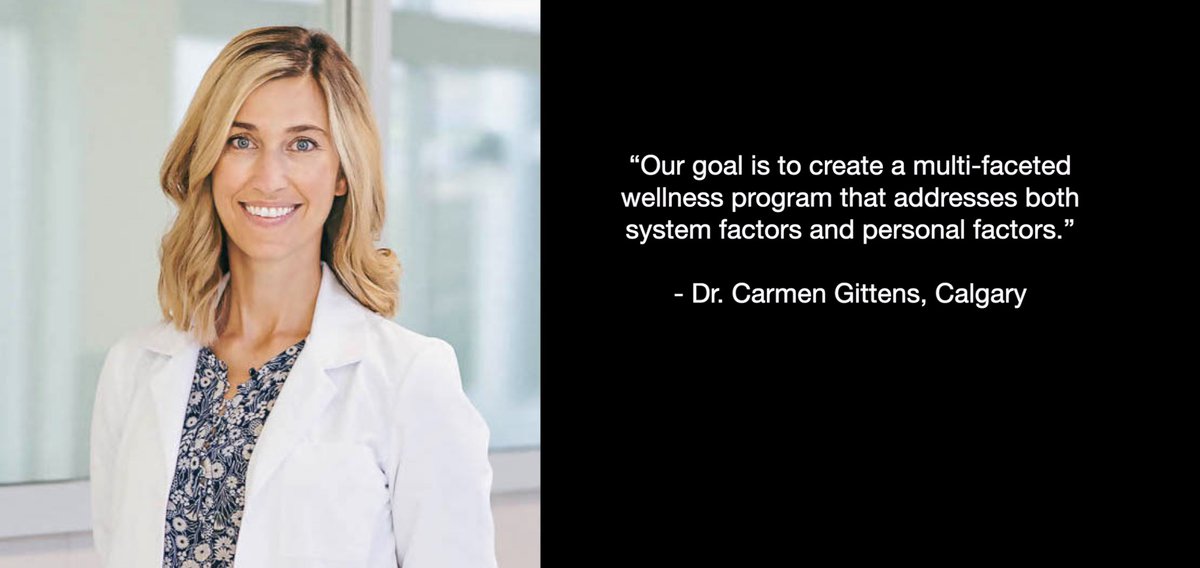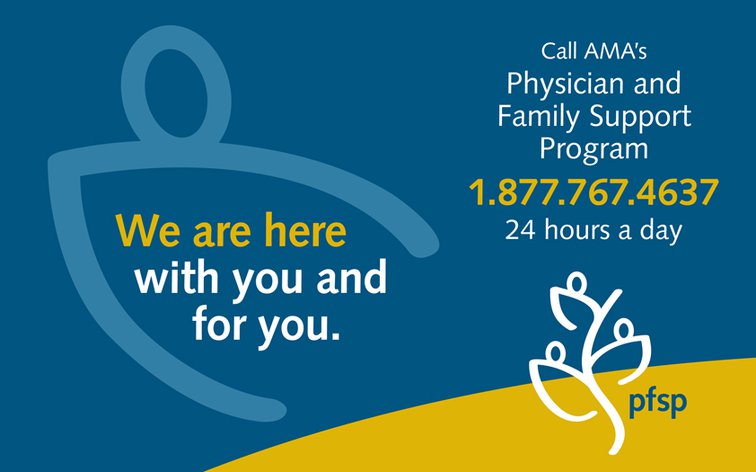When we caught up with Dr. Gittens, we asked her to describe a project she is currently working on. Here is what she shared with us.
Dr. Serena Siow and I are continuing to develop a wellness program that supports our hospitalist physician colleagues. We recently established a peer support program through the help of Well Doc Alberta. There are so many inspiring people and programs in the wellness space, including PFSP, from which we gain valuable ideas and momentum. We are making connections with this wider wellness community and looking for cost-effective and evidence-based initiatives. We are also writing about our research and have submitted papers for publication in various peer-reviewed journals.
What are your professional roles?
- BMBS, CCFP - family physician
- Hospitalist physician, Rockyview General Hospital
- Physician Lead, Physician Wellness for Calgary Hospitalists
- Clinical Lecturer, Department of Family Medicine, University of Calgary

Please describe briefly your wellness initiative with the Calgary Hospitalist group.
Our goal is to create a multi-faceted wellness program that addresses both system factors and personal factors. Using validated survey tools, we have obtained baseline measurements of physician wellness. This data has allowed us to identify the most influential areas for potential changes based on physician opinions. By coupling this data with established research on interventions that have been successful at other centers, we hope to create a program for our physicians that will make a meaningful difference. Our goal would be to see measurable improvements in their well-being.
Tell us what your colleagues can expect from you in this role.
As co-lead for the hospitalist physician wellness program, my colleagues can expect me to advocate with their best interests at heart. My main motivation is the 30% of physicians who experience burnout on a weekly basis, and the 20% of physicians who experience suicidal ideation over their lifetimes. The research shows that medical students start out more resilient than their peers of similar age and education, but over the course of their training, their mental health declines. We need to work to change the culture that breaks physicians down. We need to reject the idea that patient care is a competing interest against our own self-care. Rather, we need to extend the same compassion to ourselves as we give to others.
There is also a strong business case for improving physician wellness. Burnout is associated with reduced quality of care, poorer patient outcomes and increased costs to the health care system. Burnout has an estimated organizational cost of $6,660 per physician per year.
Please describe briefly your partnership with Dr. Serena Siow.
Serena is an amazing champion for physician wellness! She has spent so much time educating herself and passing this knowledge on to others. We could not have achieved our success to date without her rigorous research background and understanding of the different measurement tools for wellness. On a personal level, she's an inspiring friend who practices what she preaches.
We understand you were recently profiled by Well Doc Alberta. Can you tell us about that?
We thank Well Doc Alberta for profiling us! They have been an amazing support and resource. It would have been great to attend their event in person this year, but we're hopeful there will be more live events post-pandemic.
For you, what three words describe the current state of physician wellness in Alberta?
- emerging
- vulnerable
- hopeful
What three words describe your goals related to physician wellness in Alberta?
- prioritized
- measurable
- improved
As a physician yourself, what is something you do intentionally to take care of your mental health?
Focusing on healthy coping strategies as a way to deal with stress and emotions. My top two are exercise and connection which are even better done together as a walk and talk. If I've experienced something difficult at work, I often debrief with a colleague as they have a shared understanding. I am so grateful for the compassionate and kind group of hospitalists at the Rockyview who do really well at supporting one another. We hope our recently created peer support program will capitalize on this strength. As well, a formalized peer support program helps to de-stigmatize seeking support and creates culture change.
What is your cue that an area of your own wellness needs your attention?
I know my personal wellness is on unstable ground if I am irritable or looking for quick solutions to distract myself. These are cues that my balance is off, and I need to look at what is going on or what I am missing (e.g., rest, exercise, connection). It is sometimes more effort to pick the healthy solution, but it is always better in the long run and gets easier with practice.
What area of your wellness do you find the most challenging to look after?
Exercise! I am more of a read-a-good-book-under-a-cozy-blanket kind of person. So it's sometimes hard for me to get motivated to exercise, but it always makes me feel better, especially if coupled with being in nature and time with friends.
How is this challenge different now than it was earlier in your career?
It's less challenging now that I am more comfortable in my work and my children are in full days of school. Of course, the work we do on wellness has bolstered my knowledge and ability to prioritize myself.
If you had a magic wand for physician wellness what would you do?
We know that improving the system and culture of medicine would have the biggest impact on physician wellness. We cannot expect physicians to be well by relying on superhuman resilience alone. Unfortunately, system changes are difficult, both logistically and otherwise, and take time to implement. The goal of our wellness program is to help evolve the system and culture, but until these changes occur, I would hope physicians practice self-compassion as well as healthy boundary setting. We must recognize that physicians are increasingly being asked to do more with less. They rise to these challenges, putting themselves under tremendous pressure. Unfortunately, however, we know in the long run these approaches make physicians unwell and actually negatively impact patient care and costs to the system.
There is a human cost as well, with suicide being the only cause of mortality that is higher in physicians than non-physicians. Male physicians are 40% more likely to die by suicide and the risk in female physicians is more than doubled in comparison to non-physicians. We need to say no to impossible demands. A system that supports the wellness of physicians is the way to achieve excellent patient care.
What one thing do you want your colleagues to know?
I want our physician colleagues to know they are valued and appreciated. We see the hard things you do and recognize the difficult experiences and sacrifices.
With respect to physician wellness, what is your greatest of all time (#GOAT) and why?
My GOAT is Dr. Tait Shanafelt, the Chief Wellness Officer from Stanford who has laid amazing groundwork for an evidence-based approach to physician wellness through system changes. Their WellMD Center is inspirational. The center awarded Calgary's own Dr. Jane Lemaire with the Physician Well-Being Article Award for her 2018 article Understanding How Patients Perceive Physician Wellness and its Links to Patient Care. Jane is a trailblazer who has been researching and educating on wellness before many were even acknowledging the issue. We are so lucky to have her expertise and Well Doc in Alberta.
And now for fun, tell us your preference in each of the following pairs.
Dog or cat - dog
Rural or urban - rural on the weekends, urban during the week
Sweet or salty - salty
Introvert or extrovert - introvert
Yoga or Zumba - Zumba
Text or call - calling is better for connection but texting for efficiency
Summer or winter – fall!
Journal or meditate - journal
Sing or dance - dance
